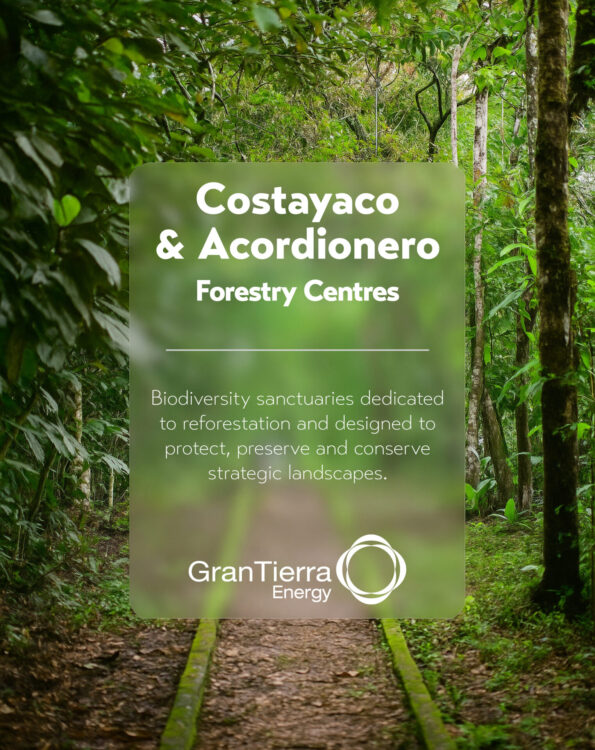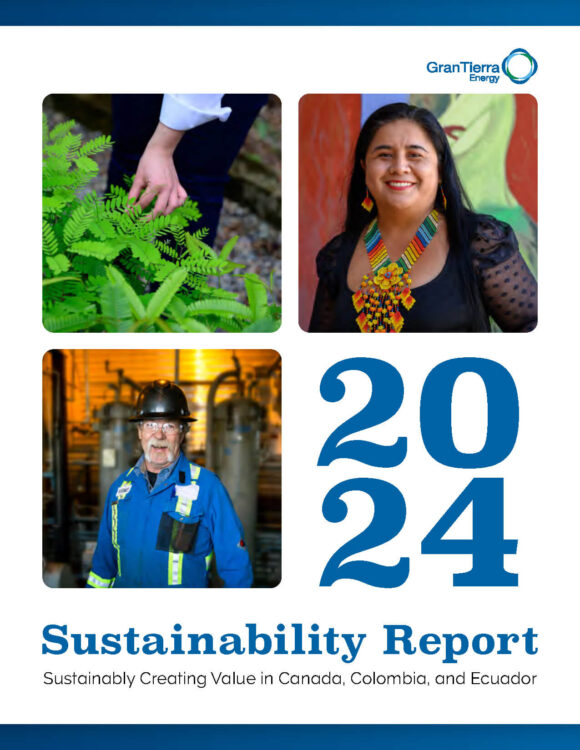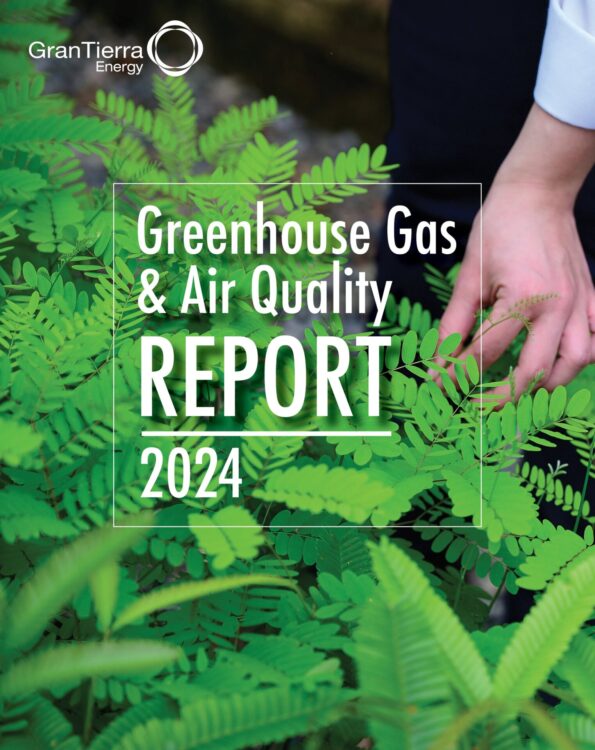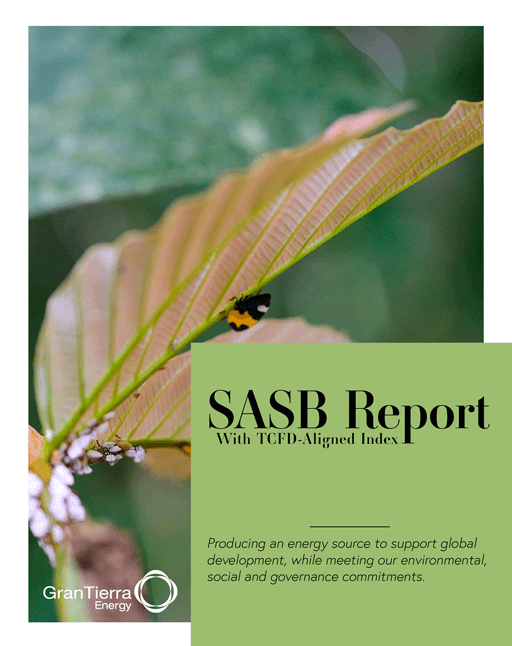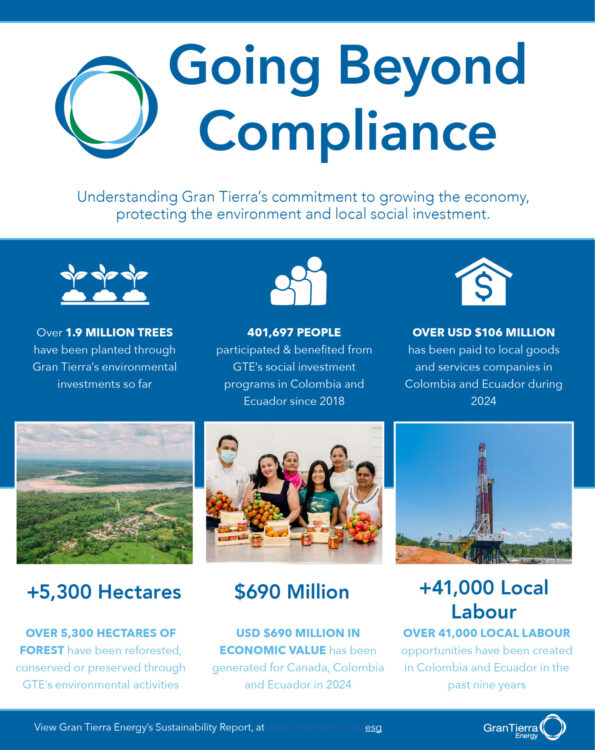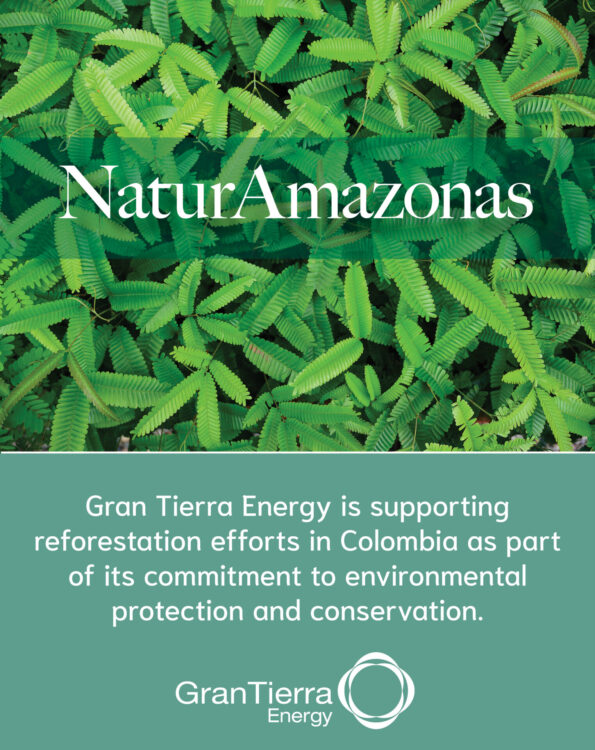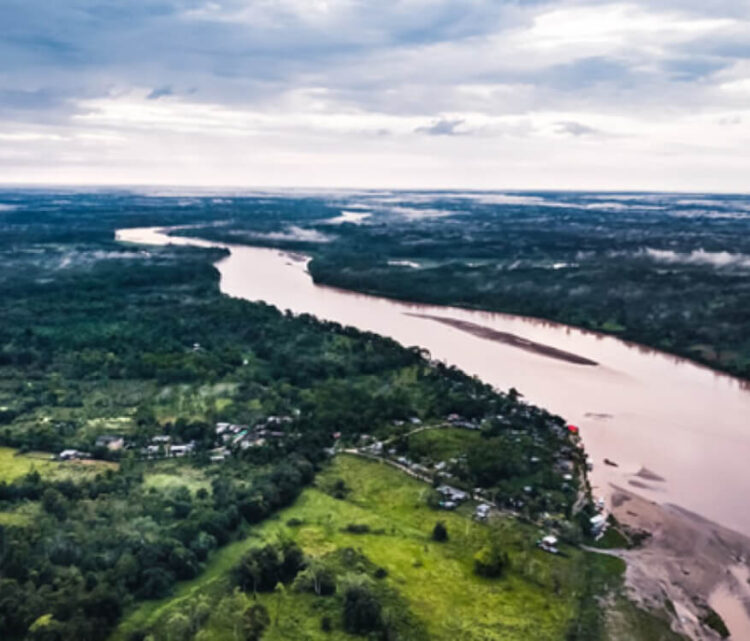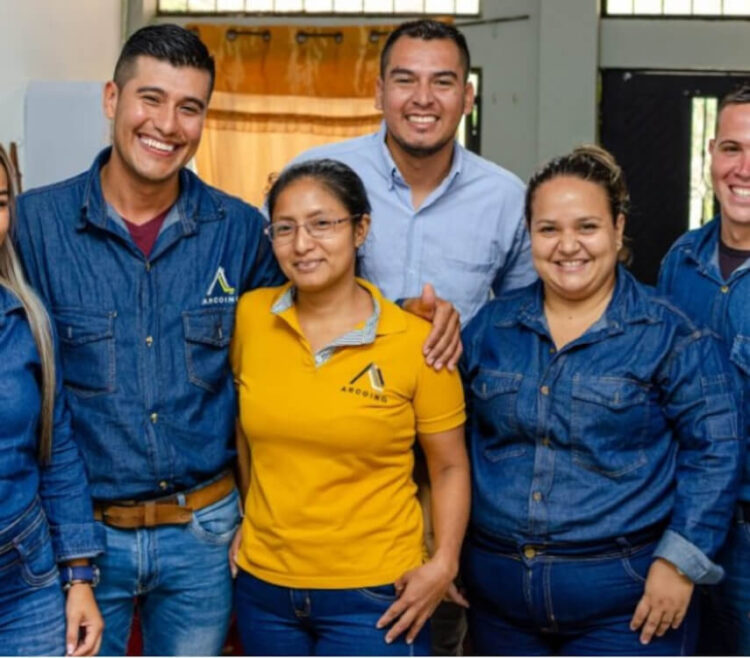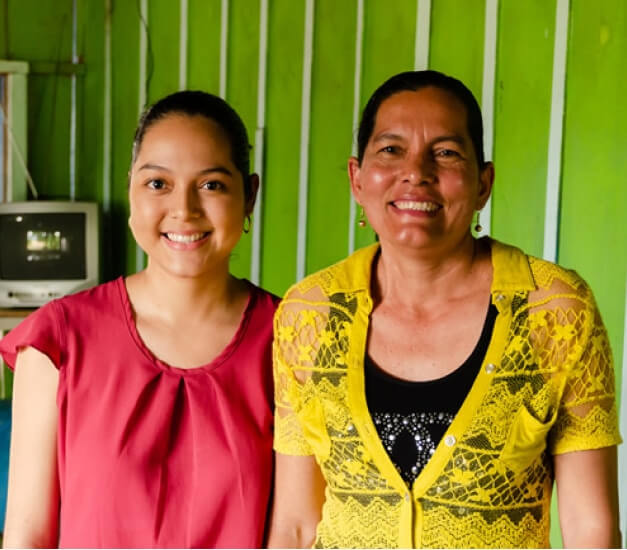Gran Tierra Energy is committed to providing meaningful opportunities for economic growth, community development, prioritizing local goods and services and maximizing our social and environmental investments through our philosophy of working Beyond Compliance. We attach great importance to the Company’s approach to managing Environmental, Social and Governance (ESG) factors that are material to the business.
The following reports highlight our transparent strategies to protect the environment, support local communities, and operate in a responsible way.
Sustainability Reports
Sustainability Report
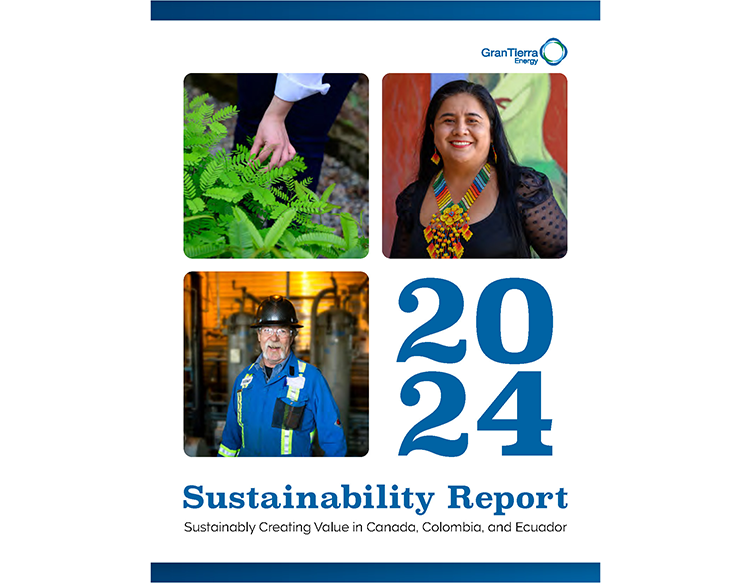
GTE is committed to sustainable activities wherever the Company operates by providing meaningful training and employment opportunities, a preference for local goods and services, and by investing voluntarily in social and environmental projects.
This is a fundamental philosophy that we align with the priorities of local and national governments for peace and stability that prioritize strengthening local economies, entrepreneurship, housing and incomes unrelated to the oil industry.
- Economy Data
INDICATOR UNITS 2022 2023 2024 Economic Value Generated and Distributed1 millions of $ 789.0 748.0 689.6 Payments to Suppliers, Contractors and Other Third Parties millions of $ 522.0 452.0 490.0 Payments to Governments (Taxes, Royalties) millions of $ 314.0 274.0 213.8 Payments to Employees (Salaries and Benefits) millions of $ 20.0 23.0 43.1 Investment in Communities millions of $ 8.0 11.0 11.4 Payments to Providers of Capital (Debt, Interest, Dividends) millions of $ 0.0 0.0 0.0 Social Investment millions of $ 5.1 6.5 7.0 Temporary Local Employment contracts 4,578 5,748 5,932 Spending on Suppliers (Colombia and Ecuador) millions of $ 295.6 459.8 528.2 Regional millions of $ 40.5 103.8 99.7 Country millions of $ 247.8 353.1 367.7 International millions of $ 7.3 2.9 1.5
- Human Resources Data
INDICATOR UNITS 2022 2023 2024 Total Number of Employees count 336 351 431 Female count 125 128 165 Male count 211 223 266 Employees in Each Country Colombia count 235 234 243 Canada count 96 94 146 Ecuador count 5 23 42 Employees Covered by Collective Bargaining Agreements % 0 0 0 Rate of New Employee Hires2 % 11.0 12.0 29.23 Voluntary Turnover Rates2 % 4.2 4.0 4.41 Total Number of Hours of Training in the year (Colombia and Ecuador) hours 5,551 8,721 3,044 Average Hours of Training per Year per Employee (Colombia Only) hours/person 23.5 36.5 12.02 Average Hours of Training per Year per Employee (Ecuador Only) hours/person 2.5 6.1 3.40 Average Age of Employees (Colombia) years 41 42 43 Average Age of Employees (Canada) years 46 46 46 Average Age of Employees (Ecuador) years 46 37 39
- Safety Data
Indicator UNITS 2022 2023 2024 Employee and Contractor Safety per 200,000 exposure hours Lost Time Injury Frequency - Combined 0.06 0.00 0.00 Recordable Injury Frequency - Combined 0.08 0.04 0.03 Recordable Injury Frequency - Employees 0.08 0.04 0.03 Recordable Injury Frequency - Contractors 0.00 0.00 0.00 Lost Time Injury Frequency - Employees 0.06 0.00 0.00 Lost Time Injury Frequency - Contractors 0.00 0.00 0.00 Fatalities - Employees count 0 0 0 Fatalities - Contractors count 0 0 0 Hours Worked hours 10,038,299 10,563,154 11,440,456 Public Safety and Emergency Preparedness Safety Inspections Conducted count 7,185 5,490 6,338 Number of Emergency Simulations (Tabletop and In-person) count 408 487 448
- Environment Data
INDICATOR UNITS 2022 2023 2024 Total Number of Spill Incidents (Colombia and Ecuador)2 count 87 59 71 Contained Discharges2 count 60 55 41 Environmental Incidents2 count 20 3 9 Oil or Chemical Spills < 1 bbl2 count 7 1 14 Oil or Chemical Spills > 1 bbl2 count 0 0 7 Spills caused by third parties (vandalism, theft, or tanker truck accidents)2 count 0 8 9 Volume of Spills 2,4 m3 11.1 5.0 13.5 Aggregate Quantity of Significant or Reportable Spills2 m3 0 0 7.60 Water Withdrawal2 thousand m3 1,150.31 1,280.27 1,340.86 Water from Rivers and Creeks2 thousandm3 854.81 949.11 1,070.47 Water from Third Parties2 thousand m3 276.54 311.08 251.72 Water from Wells2 thousand m3 18.96 20.08 18.66 Water Discharged2,5 thousand m3 84.56 74.04 118.92 Other Water-related Measures Produced Water3 thousand m3 8,918.41 11,142.98 12,301.70 Water Injected into Active Wells3 thousand m3 8,622.08 10,804.15 11,071.96 Non-Enterprise Water Consumption (Head Office) thousand m3 3.10 2.99 4.89 Total Water Consumed2 thousand m3 1,065.75 1,206.23 1,221.94 Total GHG Emissions (CO2E)2,5 metric tonnes CO2e 712,494 727,358 723,503 Scope 12 metric tonnes CO2e 552,838 525,534 496,969 Scope 22 metric tonnes CO2e 159,656 201,824 226,534 Regulatory Compliance Number of Inspections by Authorities2 count 86 64 193 Number of Findings and Non-Compliances2 count 6 4 55 Number of Findings that Resulted in Fines or Non-Monetary Sanctions2 count 0 0 0 Incidents of Non-compliance with Water Quality or
Quantity Permits, Standards, or Regulations2count 0 0 2 Total Waste2 tonnes 1,880 5,541 11,505 Hazardous Waste (as defined in the Country)2 tonnes 1,439 5,226 3,939 Non-Hazardous Waste2 tonnes 441 315.23 7,566 Non-Hazardous Waste Include Percentage of Waste Recycled2 % 36 7 2.83 Non-Hazardous Waste Include Percentage of Waste Incinerated2 % 0 0 0.54 Non-Hazardous Waste Include Percentage of Waste Landfilled2 % 64 93 96.63 Energy Derived from Renewable and Non-Renewable Sources3 kWh 257,075,796 325,070,749 341,341,445 Energy Purchased3 kWh 29,377,750 32,681,004 33,496,170 Total Energy Consumption Within the Organization3 kWh 286,453,546 357,751,753 374,837,615
Total Energy Consumption That is Derived from Non-renewable Sources (Fossil Fuels)3
kWh261,362,010 332,613,525 351,175,921 Total Energy Consumption That Is Derived from Renewable Sources3 kWh 25,091,536 25,138,228 23,661,694 Percentage of Energy Used That Is Derived from Non-Renewable Sources3 % 91.2 93.0 93.7 Percentage of Energy Used That Is Derived from Renewable Sources3 % 8.8 7.0 6.3 Percentage of Consumed Energy from the Grid3 % 10.3 9.1 8.9
- Communities and Human Rights Data
INDICATOR UNITS 2022 2023 2024 Total Number of Grievances count 1,485 1,461 1,527 Resolved count 1,485 1,461 1,527 In Progress count 0 0 0 Grievances by Type/Subject Labour Practices count 286 230 205 Environmental Impacts count 105 119 106 Procurement of Goods and Services count 177 165 188 Land Access count 22 30 41 Human Rights count 0 1 1 Other Causes (Impacts on Third Parties, Infrastructure) count 857 916 986 Total Number of Active Prior Consultations count 16 13 6 Total Number of Prior Consultations Concluded count 7 3 0 Number of Ethnic Communities Consulted count 16 13 6
-
VIEW FOOTNOTES
-
All monetary values are in USD. Figures may differ slightly due to rounding. Please note, certain data points for previous years have been restated as Gran Tierra works to enhance its data collection approach and alignment with leading ESG reporting frameworks. Certain scope, boundaries, definitions, and calculation methods may have been updated and refined.
1. Total includes all Capex, Opex, G&A, acquisitions, taxes and royalties in 2024.
2. Includes Canada, Colombia and Ecuador data for 2024.
3. Includes Colombia and Ecuador data for the entire calendar year 2024.
4. Includes the volumes from all four types of spills except those caused by third parties.
5. No untreated wastewater is discharged.
6. Calculations are made under the Operational Control Boundary.

SASB Report

ESTMA Reports
Forced Labour Report
Our Approach to Responsible Sustainability
Creating long-term value & delivering on our environmental, social & governance commitments
ESTMA Reporting
Forced Labour Reporting
Learn More About Gran Tierra Energy
In addition to our general website disclaimer, note that the statements on this site are drawn from various sources which despite adequate and proper efforts may contain inaccuracies.

